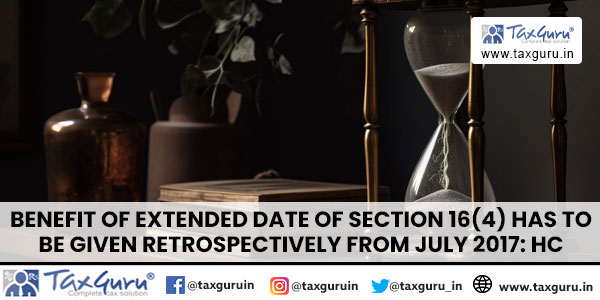Introduction: Kerala High Court has ruled in the case of : M.Trade Links Vs Union Of India that the extended date for claiming Input Tax Credit (ITC) under Section 16(4) of the GST Act should be applied retrospectively from July 2017. This landmark decision underscores the need to balance procedural compliance with the substantive rights of taxpayers. The petitioner argued that procedural provisions should not override the taxpayer’s right to ITC and highlighted various grounds on which the existing provisions were deemed arbitrary and unconstitutional.
Submission of Petitioner:
Procedural Provision : Petitioner submitted that Section 16(4) is a procedural provision, and by recourse to the procedural provision, the substantive right of the taxpayer, i.e., the claim of ITC on the inward supply, cannot be defeated.
Arbitrary : Provisions of Section 16(4) of the Act are arbitrary in nature and hence violative of Articles 14 and 19(1)(g) of the Constitution of India.
Late Fee & Interest on late filing : Filing of returns with late fees and interest cures the defect of late filing. Once a return has been filed with a late fee, the substantial claim of the dealer should not be defeated regarding ITC, which is otherwise admissible to him under the provisions of the Act. Once the returns are accepted with the late fee, the dealer should be eligible for the ITC. Once the delay is regularised, such returns are to be construed to be filed within the due date.
ITC is a Vested Right : It is further submitted that ITC is a facility of credit, and it is in the nature of vested rights. The credit earned under the GST Act is the property of the taxable person, and therefore, the denial of ITC would be in violation of Article 300A of the Constitution of India.

Non-disclosure of ITC in GSTR-3B is only a procedural lapse : Since, the details of ITC are already available in GSTR-2A, which is available with the Department prior to the due date prescribed under Section 16(4), and the availment of ITC would be a mere disclosure in GSTR-3B, therefore, the substantial benefit cannot be denied due to procedural lapse of mere non-disclosure in GSTR-3B within the due date.
Supplier acts as an agent of Govt to collect tax : It is also submitted that the supplier dealer acts as an agent of the Government to collect tax from the recipient dealer. The recipient dealer would pay the tax to the supplier dealer while receiving the supply of goods or services from him, and the supplier dealer collects tax on behalf of the Government to be deposited by him with the Government. It is submitted that though the tax has been collected by the Government through the supplier dealer, the ITC would be disallowed to the recipient dealer on the ground that he could not file the return in GSTR-3B on time and did not claim the ITC within the time specified under Section 16(4).
ITC denial amount to Double Taxation : It is also submitted that it amounts to double taxation; the recipient dealer would have already paid the tax on the supply received to the Government through the supplier dealer, but if he, for any reason, has not filed the return on GSTR-3B claiming ITC on time, he would have to pay entire tax with interest and penalty. It is, therefore, submitted that such a condition of claiming ITC by filing GSTR-3B on time is unreasonable and arbitrary against the spirit of the GST regime.
Purpose of Law : The purpose of Section 16(4) is to ensure that the ITC should be taken in a timely manner within the specified time limit in the Books of Accounts of the registered tax person. Section 16(4) of the Act does not permit to avail ITC relating to the preceding financial year in case of delayed filing of the subsequent year’s September month GSTR-3B. Considering the intricacies, and complexity associated with return filing during the initial years of GST, Technical glitches, frequent amendments, the careful process followed in ascertaining eligible ITC, knowledge level of the taxpayer in understanding the flow of credit through a dynamic return GSTR-2A and other related factors should be considered, and therefore, if the returns have been filed beyond the time prescribed with late fees, the dealers should not be denied of his claim for ITC as reflected in GSTR-2A.
Conclusion: The High Court’s decision to apply the extended date of Section 16(4) retrospectively from July 2017 marks a significant victory for taxpayers. By recognizing ITC as a vested right and addressing procedural lapses with pragmatic solutions, the court has reinforced the principles of fairness and justice within the GST framework. This ruling not only alleviates the burden on taxpayers but also ensures that the fundamental spirit of the GST regime is upheld.





